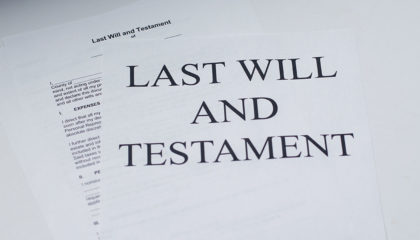Reasons to Contest the Validity of a Will
There are a number of what lawyers call ‘formal’ requirements of a valid will. If the form of the will does not meet those requirements, it may not be accepted by the Court. Those requirements are set out in sections 36 to 40 of the British Columbia Wills, Estates and Succession Act or WESA.
It is not uncommon for individuals who are the beneficiaries of a will or those who believe that they have been unfairly excluded from a will to consider contesting the will’s validity. While, under BC law, wills that are otherwise valid can be challenged or failing to provide adequate provision for the testator’s spouse or children, a will’s validity itself can be attacked. Some of the more common grounds under which a will can be challenged are detailed below. For information or advice regarding a specific case, call McLarty Wolf today.
Lack of mental capacity on the part of the testator
A person who makes a will must be aware of the fact that he or she is making a will, be aware of the property at issue, understand what he or she was giving and to whom, and be free from a mental defect that could affect his or her judgment regarding these kinds of issues. These kinds of challenges to a will are common when people make a will later in life or when they are in the early stages of an illness that may affect their judgment.
Undue Influence
In some cases, there may be evidence that the terms of a person’s will were the result of the coercion or overbearing nature of another person and that they do not accurately reflect the wishes of the testator. When this is the case, a will’s validity may be challenged for undue influence.
Due Execution
In order to be valid, a will must comply with certain legal formalities, including the fact that the will must be in writing, signed by the testator or at the testator’s direction, the signature must be made or acknowledged by the testator in the presence of two witnesses who are both present, the witnesses must sign the will, and the testator must be at least 16. There are specific provisions for members of the armed forces, so always check with a lawyer regarding the validity of your will.
Generally, to be valid, a will must be in writing, signed at the end of the document by the will-maker who is at least 16 years old, in the presence of at least two adult witnesses who also must sign the will in the presence of the will-maker.
Until recently, if a will failed to meet the formal requirements for making a valid will, it would not be probated and the will-maker’s descendants would be forced to look for a will made at an earlier time or potentially be faced with an intestacy, that is the estate would have to be administered without reference to the deceased’s wishes. On an intestacy, the distribution rules established in WESA (or its predecessor statute) would determine who received the deceased’s assets.
However, one of the changes legislated by WESA is that the Court is given the power to determine that a document which does not meet the formal requirements of a will, for example because the deceased’s signature on the document is not witnessed, should still be accepted as the deceased’s last will and probated by the Court. In order to cure a formal deficiency in a document and hold that it is in fact a will, the Court must be satisfied on a balance of probabilities that the document is authentic and records the ‘fixed and final expression of the deceased’s testamentary intentions’.
Therefore a will, or a document that is the subject of an application to the Court to have it accepted as a will, may be challenged because it fails to satisfy the formal requirements, is not authentic, or fails to record the fixed and final expression of the deceased’s testamentary intentions.
It should be noted that there are special rules regarding the formal validity of wills made by members of the armed forces or if the will was made outside of British Columbia.











